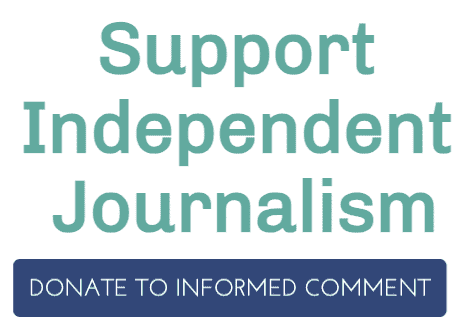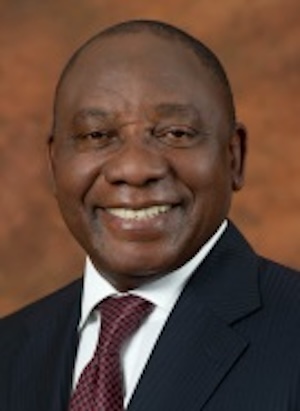Ann Arbor (Informed Comment) – South African society has had extensive experience with racial Apartheid (segregation and humiliation) and with genocide, which is defined in international law this way: “Genocide is the intentional a physical destruction of a social group in its entirety, or the intentional annihilation of such a significant part of the group that it is no longer able to reproduce itself biologically or culturally,” So writes Mohamed Adhikari in his book, The Anatomy of a South African Genocide : The Extermination of the Cape San Peoples, Ohio University Press, 2011.
Adhikari explains that “the ≠Khomani San are a tiny remnant of the foraging communities that once inhabited most of the land that currently constitutes South Africa.” They have now been pushed into the Kalahari desert in the North Cape province. Outsiders sometimes refer to the San as “Bushmen.” The Dutch Trekboers who went into areas beyond the Cape, especially in the late 1700s, conducted what can only be called a genocide against the San, whom they did not consider entirely human.
The Germans in Southwest Africa (now Namibia) committed genocide against the Herero people in 1904–07. Their tactics presaged the slaughter of WW I in that they used machine guns on crowds and lightly armed anticolonial men.
Some African thinkers consider the system of Apartheid practiced by white South Africans in 1948-1994 as a form of genocide, but the two crimes differ in their technical definition in international law.
In international law, genocide is not the same as annihilation. As defined in contemporary treaties such as the Rome Statute, it can involve killing relatively few individuals, but doing it in such a way as to deliberately cripple their ability to survive as a people. The key elements are intentionally targeting a people because of its ethnic identity and attempting to wipe out its peoplehood. Israel’s destruction of all Gaza universities and many other schools, and its killing of so many professors and journalists in what looks like a campaign of targeted assassinations, looks genocidal, since schools and universities and the press carry a people’s identity.
South Africa’s president, Cyril Ramaphosa, was known for preaching, singing and dancing for the church when he was in high school. He was trained as an attorney under the Apartheid regime, and was jailed by the white Afrikaner government twice for protesting, including spending 6 months in prison after the Soweto uprising. (He was born in Soweto.) In 1982 he helped found and became general secretary of the National Union of Mineworkers, which grew to 300,000 members under his leadership and staged the largest strike in South Africa’s history in 1987.
President Cyril Ramaphosa, courtesy South African Government
In the Apartheid period, Israel was a staunch supporter of the Apartheid regime and even sought nuclear cooperation with it against Black African countries. The United States government also frequently ran interference for Apartheid-era Pretoria.
In 1994 Ramaphosa led the drafting of South Africa’s first democratic constitution. He served in parliament for some years. He later was involved in promoting the country’s private sector. He was elected president in 2017.
Ramaphosa roundly condemned the Hamas attack of October 7. But the BBC reports that a week into Israel’s aerial bombardment of the Strip, the president “led 60 party leaders as they waved Palestinian flags, while wearing the traditional chequered black and white Palestinian scarf, the keffiyeh. He said regarding the Palestinians, “They are people who have been under occupation for almost 75 years . . . They have been waiting and waging a war against a government that has been dubbed an apartheid state.” He added, “We have always pledged our solidarity, and have always insisted that the only solution, especially with the issues of Palestine, is a two-state solution.”
On Friday, South Africa preferred a case against Israel with the International Court of Justice for genocide in Gaza. The ICJ adjudicates cases between UN members, and both South Africa and Israel are members. Both are also signatories to the 1948 Convention on the Prevention and Punishment of Genocide.

Pretoria’s Department of International Relations said Friday, “South Africa is gravely concerned with the plight of civilians caught in the present Israeli attacks on the Gaza Strip due to the indiscriminate use of force and forcible removal of inhabitants.” The phrases “indiscriminate use of force” and “forcible removal of inhabitants” are both technical terms that refer to war crimes in the Geneva Conventions and other instruments of International Humanitarian Law. The government underlines that it “condemns all violence and attacks against all civilians, including Israelis.” This latter is a reference to the Hamas atrocities of October 7, which left over a thousand Israelis dead, the bulk of them innocent civilians.
Pretoria explained, “As a State Party to the Convention on the Prevention and Punishment of the Crime of Genocide, South Africa is under a treaty obligation to prevent genocide from occurring. Therefore, at a special meeting held on 8 December 2023, Cabinet directed that the International Court of Justice in The Hague be approached to obtain an order directing Israel, which is also a State Party, to refrain from any acts that may constitute genocide or related crimes under the Convention.”
Please watch this video for its important discussion of the ways in which international tribunals of justice have consistently discriminated against peoples in the global South and in favor of those in the wealthy North.
SABC: “SA drags Israel before the International Court of Justice: Sophie Mokoena weighs in”
South Africa has a nominal GDP of some $400 bn annually and its military is ranked 33rd in the world. It is a member of the BRICs bloc of countries outside the North Atlantic centers of power and wealth.
The ICJ reported (see the letter below) that South Africa said of the government of Prime Minister Binyamin Netanyahu that “acts and omissions by Israel … are genocidal in character, as they are commnitted with the requisite specific intent … to destroy Palestinians in Gaza as a part of the broader Palestinian national, racial and ethnical group.”
The reason the South African government of Cyril Ramaphosa said that Israel’s actions were committed with “specific intent” is that intentionality is important to the definition of genocide. If a country took an action that inadvertently led to the destruction of a people, that would not be genocide, however tragic it was.
South Africa charged that “the conduct of Israel – through its State organs, State agents, and other persons and entities acting on its instructions or under its direction, control or influence – in relation to Palestinians in Gaza, is in violation of its obligations under the Genocide Convention.”
Pretoria asked the Court to take provisional measures immediately to halt the ongoing genocide.
This is the letter that the ICJ issued in recognition of the South African claim:
- INTERNATIONAL COURT OF JUSTICE
Peace Palace, Camegieplein 2,2517 KJ The Hague, Netherlands Tel.: +31(0)70302 2323 Fax: +31(0)70364 9928
Press Release
No. 2023/77
29 December 2023
The Republic of South Africa institutes proceedings against the State of lsrael and requests the Court to indicate provisional measures.
THE HAGUE, 29 December 2023. South Africa today filed an application instituting proceedings against Israel before the International Court of Justice (ICJ), the principal judicial organ of the United Nations, conceming alleged violations by Israel of its obligations under the Convention on the Prevention and Punishment of the Crime of Genocide (the “Genocide Convention”) in relation to Palestinians in the Gaza Strip.
According to the Application, “acts and omissions by Israel … are genocidal in character, as they are committed with the requisite specific intent … to destroy Palestinians in Gaza as a part of the broader Palestinian national, racial and ethnical group” and that “the conduct of Israel – through its State organs, State agents, and other persons and entities acting on its instructions or under its direction, control or influence – in relation to Palestinians in Gaza, is in violation of its obligations under the Genocide Convention”.
The Applicant further states that “Israel, since 7 October 2023 in particular, has failed to prevent genocide and has failed to prosecute the direct and public incitement to genocide” and that “Israel has engaged in, is engaging in and risks further engaging in genocidal acts against the Palestinian people in Gaza”.
South Africa seeks to found the Court’s jurisdiction on Article 36, paragraph 1, of the Statute of the Comt and on Article IX of the Genocide Convention, to which both South Africa and Israel are parties.
The Application also contains a Request for the indication of provisional measures, pursuant to Article 41 of the Statute of the Court and Articles 73, 74 and 75 of the Rules of Court. The Applicant requests the Court to indicate provisional measures in order to “protect against further, severe and irreparable harm to the rights of the Palestinian people under the Genocide Convention” and “to ensure Israel’s compliance with its obligations tmder the Genocide Convention not to engage in genocide, and to prevent and to punish genocide”.
Pursuant to Article 74 of the Rules of Court, “[a] request for the indication of provisional measures shall have priority over all other cases”.




 © 2025 All Rights Reserved
© 2025 All Rights Reserved